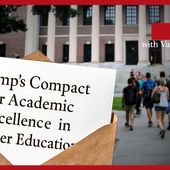Artificial intelligence is infiltrating the political world as national legislatures work to adopt new technology tools and ensure lawmakers are in charge of the machines rather than the other way around.
Brazil is experimenting with facial recognition for legislators to work remotely, Finnish policymakers interrogated AI personalities at a hearing, and Singapore built an AI model into legislators’ government-issued laptops, according to a POPVOX Foundation study.
POPVOX, a nonprofit aiming to improve governments’ understanding of technology, investigated the adoption of AI tools by lawmakers worldwide and found that the U.S. Congress is working to incorporate new generative AI. Congressional staffers have been trained on the ins and outs of generative AI products and closely monitor guidance distributed from Capitol Hill.
“With the ongoing advancements in large language models and AI tools, and the growing interest in AI applications within legislative contexts, there is an expectation of more comprehensive AI integration in parliaments in 2024 and beyond,” POPVOX said.
Artificial intelligence is a field of science and engineering that uses advanced computing and statistical analysis to accomplish complicated tasks. In Brazil, lawmakers are toying with “computer vision” and machine learning tools.
Brazilian lawmakers are experimenting with facial recognition technology to verify their identities for the legislature’s electronic voting systems. POPVOX found that Brazil’s legislature is also piloting AI chatbots to converse with citizens who ask about legislators, bills, budget data and other public information.
POPVOX said Brazil’s machine-learning-powered platform Ulysses tags large volumes of data, allowing voters to express their opinions on proposed legislation. It already has up to 30,000 comments on an individual bill.
Finnish lawmakers are demanding answers from AI — literally. The Finnish Parliament’s Committee for the Future conducted a 2021 hearing where members questioned two AI “personalities,” Muskie and Saara, and received written responses.
“This initiative’s purpose was to explore the potential of AI in providing perspectives and information, and the technology’s ability to formulate arguments and counterarguments, akin to the contributions of human experts,” the nonprofit’s report said.
A recent report by the consulting firm Deloitte described how European researchers used AI machine-learning models to predict how businesses and consumers would likely react to various policies to regulate the Irish economy.
“For example, researchers can examine if different funding methods or tax incentives would help support the creation of new small businesses in a specific city or high-tech industry,” the Deloitte study said. “Such models could be of great benefit as a government examines which policies could help spur domestic semiconductor manufacturing or other advanced technologies.”
That doesn’t rule out the need for legislators to make their own decisions, the study noted.
Machine-learning models “can uncover hidden outcomes of policies or programs, but only humans can decide if those outcomes would qualify as successes or failures.”
AI has not replaced expert human witnesses, but Estonia’s use of an AI system called HANS to transcribe parliamentary meetings “led to a reduction in staff, particularly in replacing the Parliament’s team of stenographers, who were nearing retirement and difficult to replace,” the POPVOX study said.
Time and money
Other parliaments are incorporating AI tools that may make clerical tasks cheaper and more efficient. Singapore’s “Pair” suite of technology tools on government-issued laptops promises to harness AI models’ capabilities without giving away government secrets.
“Pair operates on a question-answer mechanism, akin to a secure and swift version of ChatGPT tailored for public officers,” POPVOX’s report said. “It has received clearance from Singapore’s Smart Nation and Digital Government Office for use with documents up to the Restricted/Sensitive Normal classification, and its ‘bring your own data’ feature allows officers to integrate personal datasets, enhancing its adaptability and relevance.”
Concerns about AI technology’s security and effects on the workforce are among the potential pitfalls preventing an uncritical embrace of the technology worldwide. AI was a dominant theme at this year’s summit of global government and business leaders in Davos, Switzerland.
Chinese Premier Li Qiang called AI a “double-edged sword” in a Davos speech on Tuesday and indicated that the communist regime wants to ramp up its communication with other nations on rules to govern the use of powerful AI technologies.
“Human beings must control the machines instead of having the machines control us,” he said. He said AI development needs a red line but did not fully explain where to draw it.
Congress has spent months studying potential rules for AI and has yet to answer big questions about regulating AI development and deployment without constraining the commercial prospects of the technology.
Aubrey Wilson, director of government innovation at POPVOX, said Congress is ahead of the curve in adopting AI tools. She said the COVID-19 pandemic helped many on Capitol Hill get comfortable using new technology, shifting the way lawmakers do their job.
“For the first time ever, in what we think is this huge technological advancement, Congress is part of the story. They’re in the race, especially the House,” Ms. Wilson said. “They’re not behind. Congress isn’t behind in its advancement of, and adoption of, and exploration of this technology.”
Congress’ willingness to grapple with the technology is likely born out of necessity. IBM CEO Arvind Krishna told the Davos forum that people in every industry need to adapt or get left behind.
“If you embrace AI, you’re going to make yourself a lot more productive,” he said. “If you do not … you’re going to find that you do not have a job.”
• This article is based in part on wire service reports.
• Ryan Lovelace can be reached at rlovelace@washingtontimes.com.




Please read our comment policy before commenting.